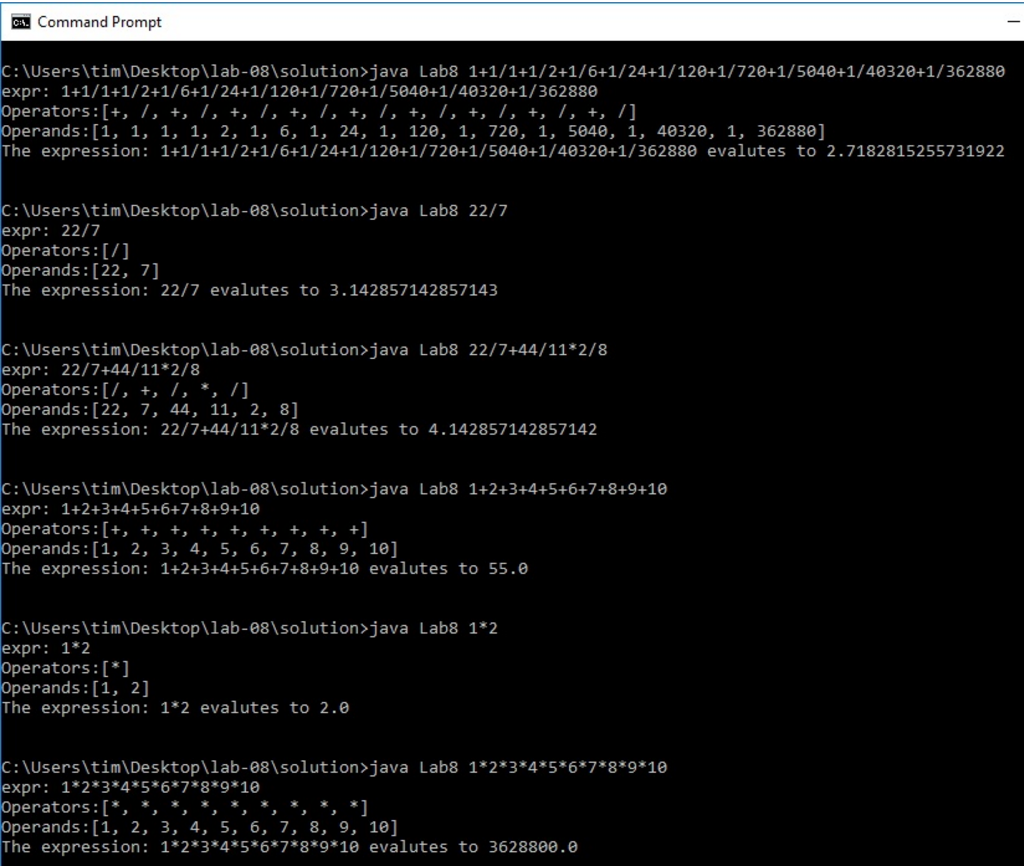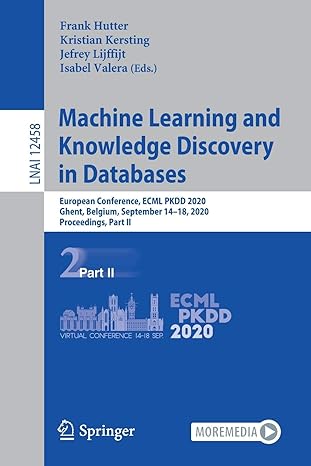Question
Fill in the code for the evaluate() method in the Lab8.java starter file. Don't change main. Suppose your expression is the following String: 20/10+30-4*6 If
Fill in the code for the evaluate() method in the Lab8.java starter file. Don't change main.
Suppose your expression is the following String: "20/10+30-4*6"
If you run this String through the tokenizer code given to you at the bottom of the SimpleCalc assignment page, you would end up with an ArrayList of operands and operators that looks something like this:
expr: 20/10+30-4*6 Operators:[/, +, -, *] Operands:[20, 10, 30, 4, 6]
A simple strategy to evaluate this is to repeatedly search the operands array looking for only the * and / operators since they are the high priority operators. Each time you find a * or / at index i, you do the following:
copy the first * or / operator you find (at index i) and save into a String var called operator
pull out the operands at index i and i+1 of the operands array.
depending on whether operator is * or / perform that operation on the two operands and save to a double named result
replace (overwrite) the operand at index i with the result, i.e. operands.set(i, result ))
operands.remove(i+1) which was the second operand
lastly remove the operator at index i using operators.remove( i )
Repeat the above until you have processed every * / operator.
Then you process the + and - operators in the same manner as above.
When you are done the operators will be empty and the operands will have only one value in it which is your answer to the evaluation. If the operands list has more or less than 1 value in it, the expression was invalid -OR- your algorithm is broken. Also the operators list should be empty.
expr = "1*1/2+3/4" operands: 1 1 2 3 4 operators * / + / LOOP TO FIND PROCESS ALL * / OPS LEFT TO RIGHT scan operators for first occurance of * or / * is found at index=0 so its operands are always at 0 and 1 in operands list operand1=1 at index 0 operand2=1 at index 1 result = operand1*operand2 = 1.0 operand.set( 0, result ); overwrite operand at index 0 operand.remove( 1 ); // remove the second one operator.remove(0); // remove the * operator at index 0 after first operator processed: operands: 1 2 3 4 operators / + / ----------------------------------------------------------- scan operators for first occurance of * or / / is found at index=0 so its operands are always at 0 and 1 in operands list operand1=1 at index 0 operand2=2 at index 1 result = operand1/operand2 = 0.5 operand.set( 0, result ); overwrite operand at index 0 operand.remove( 1 ); // remove the second one operator.remove(0); // remove the * operator at index 0 after second operator processed: operands: 0.5 3 4 operators + / ----------------------------------------------------------- scan operators for first occurance of * or / / is found at index=1 so its operands are always at 1 and 2 in operands list operand1=3 at index 1 operand2=4 at index 2 result = operand1/operand2 = 0.75 operand.set( 1, result ); overwrite operand at index 1 with result operand.remove( 2 ); // remove the second one operator.remove(1 ); // remove the * operator at index 1 after third operator processed: operands: 0.5 .75 operators + ----------------------------------------------------------- NO * or / OPERATORS REMAIN. NOW DO SIMILAR LOOP FOR + - OPERATORS scan operators for first occurance of + or - + is found at index=0 so its operands are always at 0 and 1 in operands list operand1=0.5 at index 0 operand2=0.75 at index 2 result = operand1+operand2 = 1.25 operand.set( 0, result ); overwrite operand at index 0 with result operand.remove( 1 ); // remove the second one operator.remove(0 ); // remove the * operator at index 0 after fourth operator processed: operands: 1.25 operators We are done. Answer is in operands.get(0) so we return 1.25
import java.util.*; import java.io.*; public class Lab8 { public static void main( String[] args) { if ( args.length operatorList = new ArrayList(); ArrayList operandList = new ArrayList(); // StringTokenizer is like an infile and calling .hasNext() that splits on + - / or * StringTokenizer st = new StringTokenizer( expr,"+-*/", true ); while (st.hasMoreTokens()) { String token = st.nextToken(); if ("+-/*".contains(token)) operatorList.add(token); else operandList.add(token); } System.out.println("Operators:" + operatorList); System.out.println("Operands:" + operandList); double result = evaluate( operatorList, operandList ); System.out.println("The expression: " + expr + " evalutes to " + result + " "); } // END MAIN // ............................................................................................ // Y O U W R I T E T H I S M E T H O D (WHCIH YOU MAY TRANSPLANT INTO SIMPLE CALC) // ............................................................................................ // TAKES THE LIST Of OPERATORS ANd OPERANDS RETURNS RESULT AS A DOUBLE static double evaluate( ArrayList operatorList, ArrayList operandList) { // STEP #1 SUGGEST YOU COPY/CONVERT THE OPERANDS LIST INTO A LIST OF DOUBLES // NOW YOU HAVE AN ARRAYLIST OF STRINGS (OPERATORS) AND ANOTHER OF DOUBLES (OPERANDS) // FIRST PROCESS ALL * and / operators FROM THE LIST // SECOND PROCESS ALL + and - operators FROM THE LIST // return operands.get(0); // IT SHOULD BE THE ONLY THING LEFT IN OPERANDS return 0.0; // just to make it compile. you should return the .get(0) of operands list } } // END LAB8

Step by Step Solution
There are 3 Steps involved in it
Step: 1

Get Instant Access to Expert-Tailored Solutions
See step-by-step solutions with expert insights and AI powered tools for academic success
Step: 2

Step: 3

Ace Your Homework with AI
Get the answers you need in no time with our AI-driven, step-by-step assistance
Get Started


